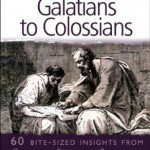Can we accept the Bible’s testimony? Can we regard it as authoritative? How do we justify our claim as evangelical Protestant Christians that it is here, and here alone, that we have an authoritative statement with respect to God’s revelation to men and women? Why do we look to this book rather than to the Church, to some tradition, to some inner light, or to our own reason and understanding? . . . It is, therefore, necessary that we should justify that, and the way to do so is to consider what the Bible itself has to say about this matter.
There are other things that could be said. There are other arguments that could be adduced and it is the province of theology to do that. But we are trying to keep ourselves to a positive exposition of biblical doctrines. I shall not, therefore, conceive it to be a part of my business to consider the so-called higher criticism movement. Theology and apologetics both do that. But here we are trying to be more positive, so let us bear in mind our definite and limited objective.
-
It is a record of divine revelation
-
It is God’s Word
-
It is divinely inspired
Everything that is in the Bible is not revelation, but everything in the Bible is inspired . . . Take, for instance, the book of Ecclesiastes, or the statements recorded in the Bible which were uttered by sinful, ungodly people. There is no revelation in such statements; nevertheless, the Bible says that all these statements, as they are recorded, are done so in an inspired manner . . . .
We do not mean that certain portions of the Bible are inspired and that others are not.
Neither do we mean simply that the men who wrote were writing in an exalted or creative way.
Neither does it mean that the books the writings as such are the product of human origin on to which the divine breath or afflatus has come.
Well, what DO we mean? The Doctor explains it like this:
We mean that the Scriptures are a divine product breathed out by God. Inspired really means God breathed. We mean that God breathed these messages into men and through them, and these Scriptures are the result of that divine action. We believe that they were produced by the creative breath of the almighty God.
But he goes even further and says that the Bible claims for itself what is called verbal inspiration.
It is not merely that the thoughts are inspired, not merely the ideas, but the actual record, down to the particular words. It is not merely that the statements are correct, but that every word is divinely inspired . . . we must make it clear that when we say that the Bible is verbally inspired by God in this way we are not teaching some sort of mechanical dictation. We do not mean that the writers sat down, as it were, as a shorthand-writer does, and that God dictated all the words to them.
The definition, then, is this: inspiration means
the writer has been controlled by the Holy Spirit of God in such a way that he cannot be guilty of error in what he writes . . . Verbal inspiration means that the Holy Spirit has thus overruled and controlled and guided these men, even in the choice of particular words, in such a way as to prevent any error, and above all to produce the result that was originally intended by God.
How does the Bible make these claims? The Doctor divides his answer into three headings:
1. Notice that the Bible makes specific claims in this matter of inspiration.
The Bible uses certain terms about itself: such as the term Scripture, which designates holy writings ; not ordinary writings; special holy writings . . . Then take the description it gives of itself as the Word of God . . . The Lord said, The Lord spake, “The word of the Lord came . . .
But there are even more specific claims, and crucial in this matter is Deuteronomy 18:18 I will raise them up a Prophet from among their brethren, like unto thee, and will put my words in his mouth; and he shall speak unto them all that I shall command him.
Not only is that a prophecy of the coming of our Lord, it also tells us much about Moses himself and his own ministry . . . all the prophets of the Old Testament make this claim. They
do not say that they suddenly decided to write; they say, “The word of the Lord came . . . and they tell you exactly when it came. They were called, they were commissioned, and the word was given to them . . . .
Another interesting fact, and a very valuable argument, is that some of these prophets tell us quite honestly that at times they were reluctant to speak.
Still another important fact is that you will find the prophet saying that he does not understand even what he himself is writing. (See Daniel 12:8, 1 Peter 1:10-12, 1 Corinthians 2:13, Ephesians 2:20).
Lloyd-Jones now addresses what he terms the crucial passages, which are those of 2 Timothy 3:16 and 2 Peter 1:20-21.
2 Timothy 3:15 in the Authorised Version reads All scripture is given by inspiration of God, and is profitable for doctrine, for reproof, for correction, for instruction in righteousness: that the man of God may be perfect, thoroughly furnished unto all good works.
So runs the Authorised Version, but the Revised Version is different; it reads, “Every scripture inspired of God is also profitable for teaching . . . This is a very serious matter because there is no question at all that at this point the Revised Version is not only wrong, but is tragically and lamentably wrong. It suggests at once that there are scriptures that are not divinely inspired. The Authorised Version, however, is quite clear about it: All scripture is given by inspiration of God.
So what can be said at this point? Well, the Revised Version makes the apostle Paul guilty of what is called tautology, saying the same thing twice over, expatiating upon the obvious. To render it All scripture [every scripture] inspired of God is also profitable makes the thing ridiculous because every scripture inspired of God is of necessity profitable, and there is no need to say so. But the Authorised Version, you notice, does not say that. It says All scripture is given by inspiration of God, and is profitable . . . which is a very different way of putting it.
2 Peter 1:20-21 says, “Knowing this first, that no prophecy of the scripture is of any private interpretation. For the prophecy came not in old time by the will of man: but holy men of God spake as they were moved by the Holy Ghost.
A most vital statement, says Lloyd-Jones. But what does Peter mean when he says no prophecy of the scripture is of any private interpretation ?
Well, he is not simply saying that no one has a right to his or her own particular interpretation of the Scriptures. No, Peter is concerned here about the origin of prophecy, the origin of Scripture, and what he means is that no prophecy of the Scripture gives any individual’s private understanding or interpretation of things . . . that when these prophecies were written, it was not a case of a man in control of himself, using his natural powers and propensities and abilities, thinking things out and then writing as best he could. Not at all! The whole time he was controlled by this gale of the Spirit, by this wind of God, this divine energy . . . and it was as a result of that process that these prophecies and these Scriptures came into being.
2. Notice the things the Bible assumes about itself and its own statements.
John 10:34-36 The scripture cannot be broken it cannot be annulled or withstood; it cannot be denied.
Galatians 3:16 Now to Abraham and his seed were the promises made. He saith not, And to seeds, as of many; but as of one, And to thy seed, which is Christ.
You see the importance of that? The apostle there attaches significance just to one single letter Now to Abraham and his seed were the promises made. With regard to this whole question of verbal inspiration, this is one of the most important statements of all. The whole argument of the apostle depends upon the fact that the Scripture says seed and not seeds. If it had said seeds then this particular argument would have been irrelevant, but because it uses the singular and not the plural it is a reference to the Lord Jesus Christ . . . .
Sometimes the Bible combines a statement from the New Testament with one from the Old Testament and refers to the two together as ‘Scriptures’. (1 Timothy 5:18)
Notice how the New Testament quotes the Old Testament. (Acts 4:24-25; Acts 13:35; Hebrews 3:7)
3. As we read the Bible, we can make certain other obvious deductions which clearly prove this doctrine of inspiration.
Lloyd-Jones makes the following points, which I will partially paraphrase:
Sixty-six books written over sixteen hundred years by over forty authors, and yet only one type of doctrine in the whole of the Bible, only one type of morality in the whole range of Scripture.
The Old Testament – the pervasive spirit is that of the hope of the Messiah.
The New Testament – only one great theme: Jesus Christ and Him crucified.
“The testimony of Jesus himself in reading the Gospels, note the way He constantly quotes the Old Testament. Notice the way He assumes it is authoritative that He puts it beyond argument or dispute whatsoever. So if you begin to play fast and loose with the authority of the Scriptures, and with the verbal inspiration of the scriptures, you are of necessity involved in difficulties about the person of the Lord Himself . . . So, in the last analysis our authority for our understanding of inspiration is to be found in the Lord Jesus Christ Himself. That was His view of the Scriptures.
In closing this chapter, the Doctor addresses questions regarding various differences and discrepancies.
There are . . . certain things which we simply cannot explain, and it is our business to say that quite readily and frankly. But let me hasten to add that most of these so-called difficulties and discrepancies which the critics bring forward can be explained, and indeed have been explained.
Still, there are a certain few differences that remain, but it is significant that they are never with respect to doctrine or historical facts . . . There is nothing which in any way interferes with vital, essential doctrine. So what we affirm and state is this: the original documents, as originally written, are inerrant and infallible.
But finally, you cannot prove to anybody that the Bible is uniquely and divinely inspired. Ultimately, people have to be enlightened by the Holy Spirit . . . . (See The Westminster Confession of Faith, Chapter I:V)












